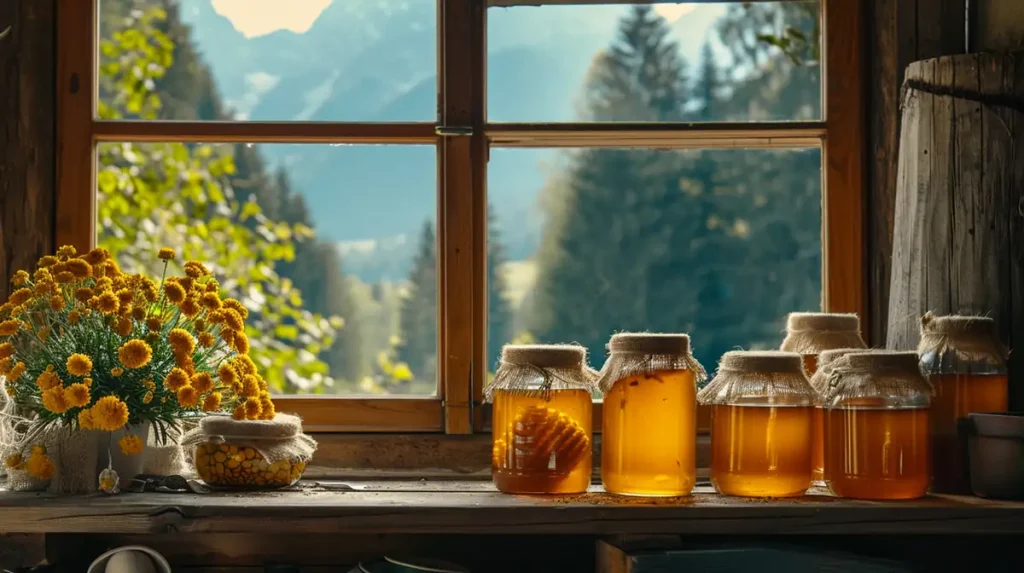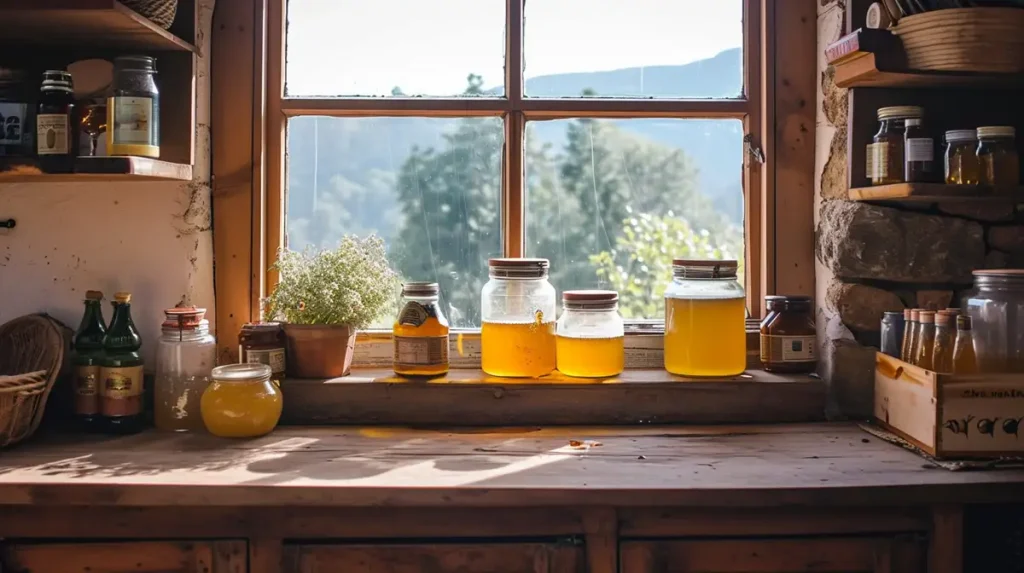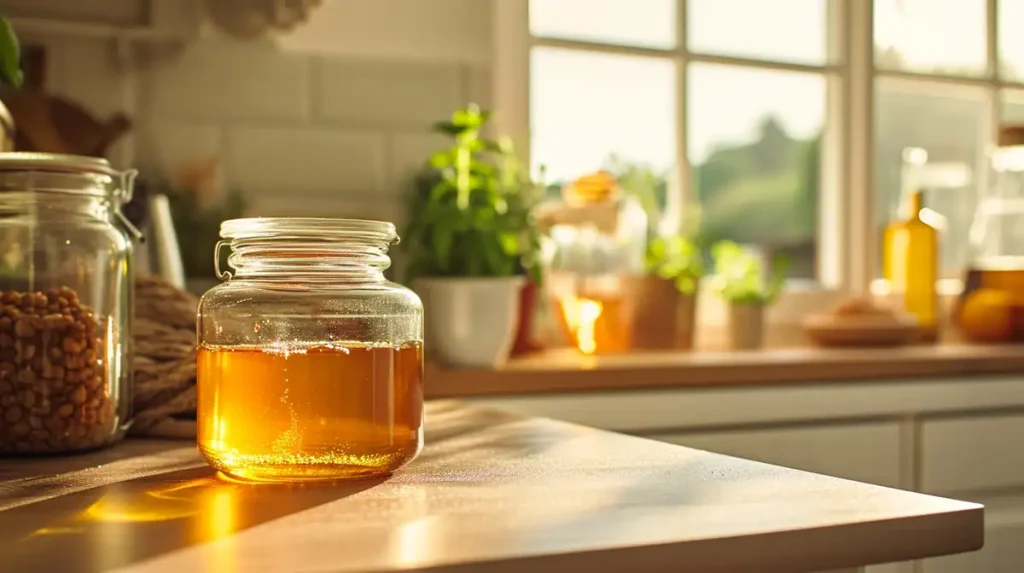Table of Contents
Storing honey properly is essential for maintaining its quality and longevity. Keep it in a tightly sealed container to prevent moisture and other contaminants from entering. Store honey at room temperature in a dry place, away from direct sunlight and heat sources, as excessive heat can degrade its quality. Avoid refrigeration, as it accelerates the crystallization process. If crystallization does occur, gently warm the honey in a water bath to return it to its liquid state. This method preserves honey’s natural flavors and beneficial properties.
In the below paragraphs, we will take a more detailed look at this topic.
Whether you have commercial honey or have obtained honey straight from the hive, correct storage will ensure it lasts indefinitely. Used as an alternative to sugar to sweeten dishes or eaten as is, honey is something that is found in most homes around the world.
What most people do not realize however is that (all things being equal) honey never goes bad. There are those that believe honey should be thrown away when it turns cloudy or begins to crystallize, but this is not the case. Provided it is stored correct, honey will still be edible in hundreds or even thousands of years’ time.
Tips for Storing Honey
Whether you buy your honey from a local supplier or collect it yourself from a hive, it’s important to store it properly to maintain its quality and freshness. To that end, here are some tips on how to store honey correctly:
1. Choose the Right Container
The container you choose to store your honey in can have a massive impact on its quality. Glass is the best choice for storing honey because it is non-reactive and does not contain any harmful chemicals. Metal containers can result in oxidization, which can affect the flavor and texture of the honey. Plastic containers are also not recommended as over time they can leech chemicals into the honey (even food-grade plastic will do this eventually).
2. Sterilize Your Container
Before storing honey in a glass container, it is important to sterilize it to remove any contaminants that could spoil the honey. Do this by boiling the jar in water for several minutes or by using a sterilizing solution. Once the jar is sterilized, make sure it is completely dry before adding the honey.
3. Store in a Cool, Dry Place
Honey should be stored in a cool, dry place away from direct sunlight. Exposure to light and heat can cause honey to darken in color and lose its flavor and aroma. It’s best to store the honey in a pantry or cupboard away from appliances that generate heat.
4. Avoid Moisture
- Carter, Anthony (Author)
- English (Publication Language)
- 194 Pages - 02/28/2024 (Publication Date) - Independently published (Publisher)
Honey absorbs moisture easily, which can cause it to ferment or spoil. Make sure your container is airtight and keep it away from any sources of moisture. If your honey does become moist, you can try to dry it out by placing it in a warm oven for a few minutes or use a dehydrator.
5. Use Clean Utensils
When using honey, always use clean utensils to avoid introducing any contaminants that could spoil it. Avoid using a wet spoon or dipping a dirty spoon into the jar of honey.
Following these simple tips will help ensure that your honey stays fresh and delicious for as long as possible. Whether you use it as a sweetener, a topping, or a cooking ingredient, properly stored honey is a treat that everyone can enjoy.

Should Honey be Placed in the Refrigerator?
Many people store their honey in the refrigerator, assuming this will prolong its shelf life or prevent it from spoiling. However, this is not necessary. In fact, it can actually have some negative effects on the quality of the honey.
Why Honey Doesn’t Need to be Refrigerated
Honey is a unique substance with a long shelf life thanks to its high sugar content, low water content, and natural antibacterial properties. As mentioned above, honey can last for years without spoiling or going bad, so there is no need to refrigerate it to extend its shelf life. Refrigeration will not preserve the quality of the honey, but it could actually cause it to crystallize faster, which can affect the texture and taste.
Honey contains natural sugars such as glucose and fructose that can crystallize over time, especially in cooler temperatures. This process is natural and does not affect the quality or safety of the honey, but it can change the texture from smooth to gritty. When honey is refrigerated, the cold temperature can cause the natural sugars to crystallize more quickly, resulting in a grainy texture.
Can Honey Spoil?
While we have ascertained that honey has a long shelf life, it is not completely immune to spoilage. There are a couple of reasons it can spoil, which we discuss below.
Causes of Honey Spoilage
Honey can spoil if it comes into contact with moisture, which can lead to the growth of yeast and bacteria. This can cause the honey to ferment, resulting in a sour or unpleasant taste. Additionally, honey can also spoil if it is exposed to extreme heat as this can cause the sugars within to break down and result in discoloration and a burnt taste.
Signs of Spoiled Honey
Spoiled honey may exhibit several signs, including a change in color, consistency, or taste. Fermented honey can become darker in color, have a fizzy texture, and give off a sour smell. Burnt honey may also appear darker than usual and have a caramelized flavor, which can be bitter or unpleasant.

What To Do with Crystallized Honey
As touched upon above, many people believe that honey that has crystallized must be thrown out because it is off. This is not the case, and much honey is wasted because of this incorrect assumption.
Crystallized honey can still be eaten and there are many who like the grainy, gritty texture of it. Nevertheless, if crystallized honey is not for you, the good news is that you can dissolve the crystals.
The best way to do this is by placing the open jar of honey into a pot of hot water (with the water no higher than about two-thirds of the jar) and stir the honey until it has returned to a liquid form. It is important to ensure that the water does not get too hot as this can caramelize the sugars in the honey and change its taste.
Another way to dissolve the crystals in honey is to place the amount you want in a dish in the microwave. It is important to use a low temperature setting though so as not to overheat the honey. When using the microwave to dissolve crystals in honey, it is best to do it in stages and stir it in between.
How to Store Honey – Conclusion
In conclusion then, honey is a versatile and delicious food that can last indefinitely – if stored correctly. Choosing the right container; sterilizing it; storing in a cool, dry place; avoiding moisture; and using clean utensils are all key to maintaining its quality and freshness. While many people assume that honey needs to be refrigerated, this is not necessary (it can actually cause it to crystallize faster). While honey can spoil if exposed to moisture or extreme heat, the signs of spoilage are easily recognizable. Crystallized honey can still be eaten, but there are simple ways to dissolve the crystals to return it to a liquid form if you so desire. By following these tips and understanding the unique properties of honey, you can enjoy this sweet treat for years to come.
FAQs for Storing Honey
Q: Can I store honey in the refrigerator? A: Yes, you can store honey in the refrigerator, but it is not necessary. Honey is naturally resistant to spoilage and can last for years without refrigeration. Storing honey in the refrigerator can cause it to crystallize faster, so it is best to store it at room temperature.
Q: Can honey go bad? A: Under normal circumstances honey does not spoil, but it can crystallize over time. Crystallized honey is safe to eat, but it can be restored to its liquid state by gently warming it if you so desire.
Q: What is the best way to store honey? A: The best way to store honey is in an airtight container at room temperature. Keep the container in a dry place, away from direct sunlight and heat sources.
Q: Can I store honey in plastic containers? A: Yes, you can store honey in plastic containers, but make sure they are food-grade and airtight. However, glass containers are a better option as they do not contain any chemicals that can leach into the honey over time.
Q: How long does honey last? A: Honey can last indefinitely if stored properly. However, over time honey may darken and crystallize, but it is still safe to eat. If you notice any signs of mold or fermentation, discard the honey.
Q: Can I store honey in the freezer? A: Freezing honey is not recommended as it can cause the moisture in the honey to expand and break down its natural enzymes. It is best to store honey at room temperature.
Q: Can honey be stored in metal containers? A: It is not recommended to store honey in metal containers as the metal can react with the acid in the honey and cause it to oxidize and spoil. Stick to glass or food-grade plastic containers.
Q: Does honey need to be stored in the dark? A: Honey should be stored in a dry place away from direct sunlight and heat sources. Exposure to light can cause honey to lose its aroma and flavor.
Q: Can I store honey in the pantry? A: Yes, storing honey in the pantry is a good option as long as it is kept in an airtight container away from sunlight and heat sources.
Q: Can I store honey in a honeycomb? A: While storing honey in a honeycomb may seem like a natural option, it is not recommended as the comb can contain dirt, debris, and bacteria that can spoil the honey over time. Stick to storing honey in clean, airtight containers.
Looking to up your beekeeping game? Check out our latest product recommendations so you can take things to the next level!
Introducing The Top 12 Best Beekeeping Veils For 2024
Introducing The Top 20 Best Beekeeping Gloves For 2024
Introducing The Absolute Best Beekeeping Suits For 2024
The 15 Top Beekeeping Books for 2024
The Top 11 Honey Extractors for 2024
The Top 12 Mason Bee Houses for 2024
Last update on 2024-04-27 / Affiliate links / Images from Amazon Product Advertising API


